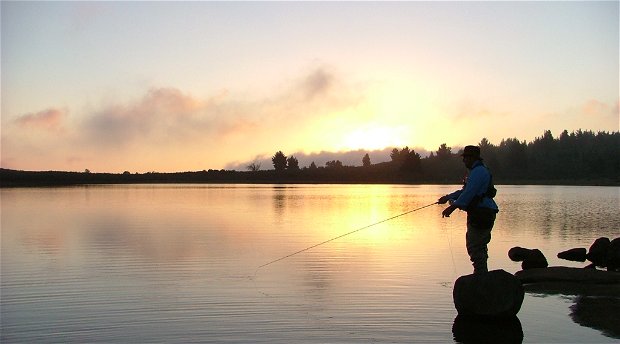Pursuing moments of Perfection - Fly Fishing in Somerset East

Fly fishing represents a myriad of facets that touch each individual differently, and that’s exactly what makes this sport so alluring. I have been fly fishing for 36 years and feel my journey has only just begun...
Fly fishing provides the tools to examine your character whilst pursuing moments of perfection. It’s like a personal CSI investigation that combines the constantly changing clues offered by nature with your character traits, so that you can reflect on them.
Fly fishing is many things, but one thing it is not about is just standing on the edge of a stretch of water going through the motions of trying to fling a fly that weighs almost nothing and hook that fish of your dreams. Regrettably it is not instant gratification and hence does not necessarily appeal to everybody.
In life we constantly strive to improve as individuals and fly fishing offers us the opportunity to do just that. Let me explain. The art of fly fishing requires that you master many skills. For the men reading this article it doesn’t necessarily mean multi asking, but rather that you execute each element competently.
Fly fishing is a personal challenge as we attempt to outwit our opponent. In the case of our fishy foe, this means eliminating one of its strongest attributes for survival, the sense of smell. We generally use flies made from fur and feathers that hardly smell to fool the fish. It is also an active sport where your success depends on your ability to make things make. If you consider that Salmon in Canada for example, breed naturally in the rivers, swim out thousands of kilometres to sea to grow into those monster fish people travel the world to catch, and then come back to that exact same spot where they were born to spawn purely through their sense of smell, one can appreciate the challenge. Add to this the fact that flies weigh next to nothing and should be presented as naturally as possible to the fish cruising by, and the challenge becomes even more difficult.
Understanding the principals of physics to use your rod to transfer energy to the line and propel the fly, and acquiring the perfect timing to achieve this successfully, is an art in itself. This is where your personality is tested. The frustration with yourself at not being able to achieve the hand to eye coordination and sense of timing to keep your fly out of the bush behind you or whipping the water to a foam in front of you that will send any fish in the area skeltering for cover. It requires tenacity, an understanding of your own capabilities, your willingness to adapt and learn and an avenue for success through feeling the presentation. The precision of presenting the fly on the proverbial tickey, taking into consideration the wind, vegetation and fact that your line must be in the air for the shortest time possible at a moment’s notice, at any given distance and direction where a fish has just moved, is a skill that requires hours of practice. But once mastered, will boost your self-confidence tremendously.
The life cycle of an insect generally transforms within twenty four hours to twelve months. It progresses from an egg, which has been laid by an adult and is attached to a structure under the water, to a crawling nymph, a swimming nymph and then an emerging nymph where it starts to develop wings and legs just below the water’s surface or in the meniscus, before hatching into an adult, mating and starting the cycle all over again. Although man has landed on the moon, we have yet to discover nature’s trigger that causes insects to hatch. At each stage of its life cycle, the insect is vulnerable to fish. It is these hatches that induce certain behavioural patterns in the fish. Find the food and you’ll find the fish!
Owning one of the many off-road vehicles that promise a lifestyle of taking you to the ends of the earth on the road less travelled is definitely an advantage. However, it is the areas where the fish live that transport you to the outdoor corridor of nature’s bounty. This is exactly where one can break free from the exoskeleton of everyday life.
When one looks at a stretch of water, where do you start fishing and with what fly? Well, the way a fish feeds will tell you what insect the fish is eating and at what stage of its life cycle it is in. This knowledge will help you to select the most appropriate fly, in other words match the hatch and you will increase your chances of being consistently successful. Whilst many people say that catching a fish is not that important but rather a bonus as you are always in magnificent surroundings, this is true. However, catching fish consistently is very gratifying. By becoming totally absorbed in the immediate environment and observing insect behaviour both in and out of the water, you arm yourself with ammunition to strategise the fish’s demise. If you aspire to become a more knowledgeable entomologist by slowing yourself down to the pace of the bugs and seducing your soul into feeling your surroundings, your physiology pulsing to the beat of Mother Nature, you do walk away rejuvenated.
The dynamics of the environment are constantly changing, so to succeed you too need to change your fishing tactics. By understanding what to do, elevates your fishing to the next level. This in turn determines your strategy as to whether you are going to fish a floating line, at what depth should your fly be and what shape, size and colour it should be? How does the insect move? Can you piece together the evidence before you to solve the mystery? This is what makes you think and stimulates such a fascinating challenge around fly fishing; the dynamics of the environment surrounding you, the flowers and plants, the beauty of the water reflecting your mood, the setting sun and the sound of the birds coming to roost. Whilst you connect your soul with Mother Nature you notice mosquitoes hovering closer now that they have picked up your scent, so you tie on a suspender buzzer. It’s as if you’ve turned nature’s key as a fish breaks the mirror reflection of the mauve water as it porpoises at one o’ clock, just 10 metres in front of you. Calmly, you pick up your line, majestically moving it through the air, stopping your rod it straightens with purpose, presenting your buzzer gently. The fish hears the fly land, turns and devours your offering. Piecing together nature’s clues, choosing the correct fly, which is even more rewarding if you have tied the fly yourself, casting and presenting the fly precisely on the spot, the fish fooled into taking your fly, THAT is a moment of perfection!
That is why we fly fish. The more you fish, the more frequently you achieve those moments of perfection and the more addicted you become as the sense of achievement in the success of that moment is enormously satisfying.
Published in Do It Now

Share This Post